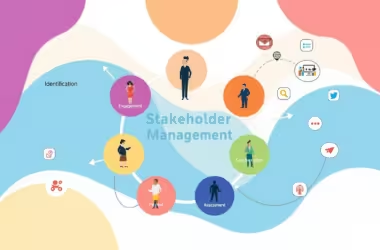What if finding work-life balance could change your whole career as a software engineer? In the fast-moving tech world, we often forget ourselves for the sake of deadlines. For software engineers working 40 to 50 hours weekly, keeping a good balance is key. It greatly affects their productivity and mental well-being.
Studies show that engineers who care for themselves and talk openly improve their job happiness. They also feel less stressed. This points to a huge fact: caring for employees’ health is a must in the tech field. This article talks about how work-life balance boosts software engineers’ work output. It also gives tips on building a lasting and happy career in technology.
Introduction to Work-Life Balance for Software Engineers
Introduction to work-life balance is key for software engineers, who often face a lot of job stress. The nature of software development brings tight deadlines and long hours. This can cut into personal time, making it hard to keep a healthy balance between work and life.
Software engineers must keep up with new technologies, adding to their workload. This need for ongoing education puts extra pressure on them. It makes finding a good work-life balance even more challenging.
Working from home has made it tough for many software engineers to separate work from personal life. This often leads to working too much. Without clear boundaries, it’s hard to switch off from work, which is important for both mental health and being productive.
To tackle these issues, software engineers need to use certain strategies. Taking regular breaks during the workday is crucial. It helps keep productivity up and prevent burnout. Adding in health and wellness activities, like exercising and eating well, also helps with handling work stress.
Good communication within teams can ease some problems too. Encouraging honest conversations helps with teamwork and understanding. This creates a better work atmosphere. Paying attention to these areas can improve software engineers’ well-being amidst their demanding jobs.
Understanding Work-Life Balance
Work-life balance means managing your personal and professional life well. It’s very important for software engineers who have busy schedules. A good balance improves health, happiness at work, and how much you get done.
Definition and Significance
For software engineers, work-life balance is key to being happy and productive. It’s about choosing quality time over trying to do everything. Through hobbies, self-growth, and family time, they find joy and fulfillment. Setting goals and taking breaks are crucial for staying sharp at work.
Common Misconceptions
There are lots of false beliefs about work-life balance. One myth is that it means splitting your time equally between work and personal life. But it’s really about managing what you have to do well. Another mistake people make is thinking working more means doing better. Actually, not balancing well can lead to less work done and more mistakes.
The Importance of Work-Life Balance for Software Engineers
Maintaining a healthy work-life balance is crucial for software engineers. It greatly affects their mental health, happiness at work, and how much they get done. Knowing how important this balance is can help them enjoy both their job and personal life more.
Impact on Mental Health
Software engineers often deal with a lot of stress because of tough workloads and tight deadlines. This bad work-life balance effects can cause mental tiredness, worry, and even sadness. Taking regular breaks and having personal time helps keep their mental health good and stops burnout. This makes sure they can keep performing well over time.
Effect on Job Satisfaction
A good balance between work and personal life really makes engineers happier with their jobs. Those who manage their time well and set clear limits feel happier at work. This happiness creates a better place to work, with friendly relationships and a supportive environment.
Correlation with Productivity
Studies show a clear link between productivity and having a good work-life balance. Engineers who look after their work duties and personal time do their tasks more quickly. They come back to work feeling fresh and sharp, which helps them contribute more to their teams and projects.
Common Factors Disrupting Work-Life Balance
Software engineers face challenges in keeping a healthy work-life balance. There are factors that disrupt it. Knowing these can help find ways to set effective boundaries.
Unpredictable Bug Fixes
Unpredictable work interruptions come from critical bug fixes. These pop up without warning, stretching work hours. It’s a tug-of-war between job tasks and personal time. Engineers often feel swamped. This makes balancing hard. Addressing bug fixes can cause weariness and annoyance, lowering happiness at work.
Overcommitment to Projects
Software engineers sometimes take on too much due to tight deadlines. Trying to meet these goals, they cut into their own time. This can cause stress, both mentally and physically. Their health may suffer as they chase project achievements. Working too much, they might edge towards burnout without realizing it.
Continuous Learning Responsibilities
The tech world changes fast, so software engineers must keep learning. This learning often eats into their free time. They feel they must keep up with new tech and methods. This makes it hard to separate job duties from personal growth. Without setting limits, they can get worn out, affecting personal life and relationships.
Strategies for Achieving Work-Life Balance
Software engineers often struggle to balance work and life. Effective strategies can help improve their well-being and productivity. These strategies include setting clear limits, taking care of oneself, and communicating well with team members.
Setting Clear Boundaries
It’s crucial for engineers to establish boundary setting practices. They need to decide specific times for work and personal life. This means not checking work emails or bringing work home during off-hours. Setting these boundaries helps lower stress and boosts focus. It lets engineers relax and recharge after work.
Keeping track of work hours helps engineers see if they’re giving enough time to personal life. This insight can show if they need to adjust their schedules for better balance.
Prioritizing Self-Care
Self-care is key for keeping energy up and stress down, especially in software engineering. Activities like exercise, eating well, and getting enough sleep are important. Taking breaks for hobbies and interests outside of work helps too. It relaxes the mind and sparks creativity.
Taking vacations and really disconnecting from work boosts happiness. This shows how key self-care is for a satisfying life.
Communication with Colleagues
Talking openly with your team helps share workloads evenly. It’s important to discuss project demands and your own limits. This sets realistic expectations. Sharing tasks and asking for help when needed makes for a supportive workplace. This way, everyone can manage stress better and maintain a good work-life balance.
The Role of Flexible Work Arrangements
Flexible work arrangements, like remote work, are becoming more popular for software engineers. Companies are seeing the value in letting team members work from home or any place they choose. This change is helping employees achieve a better balance between work and life, boosting their happiness and job satisfaction.
Remote Work Advantages
Working remotely comes with many perks that help professionals maintain focus on work and personal life. Engineers save time by cutting down their commutes, easing stress, and enjoying more freedom. This leads to several key benefits of remote work:
- Improved time management: Engineers can plan their days around their needs.
- Greater productivity: Setting up a personal work space helps with focusing.
- Lower stress levels: No commute means less daily stress.
Flexible Hours Benefits
Flexible hours also make a big difference in engineers’ lives. They can adjust their work schedules to fit personal responsibilities better. Here are the benefits of having flexible hours:
- Reduced stress: Choosing work hours can lead to working at most productive times.
- Increased job satisfaction: Personalized work schedules make employees happier and more motivated.
- Enhanced loyalty: Workers stay longer with companies that offer flexibility.
Flexible work setups are key to a healthy work-life balance for software engineers. It’s important for companies to adopt these practices to keep up productivity and keep their teams happy.
The Impact of Work Environment on Balance
Workspace design is key to balancing work and life for software engineers. A good physical environment boosts productivity and happiness. Workspaces that encourage concentration and teamwork, yet cut down on distractions, are best. Such setups improve work-life balance.
Importance of Physical Workspace Design
The design of a workspace strongly affects productivity. Allowing engineers to personalize their work areas can make them happier at work. The layout of the room, social practices, and right furniture play big roles. Research from IBM in the 1970s and later studies show that these elements are vital for engineers’ work performance.
Effects of Open vs. Closed Offices
Choosing between open and closed offices is a big decision for software engineers. Open offices make working together easier but can be too noisy. On the other hand, closed offices are quieter, which helps with focus. The best option might mix elements from both to boost teamwork and concentration.
Work-Life Balance and Software Engineer Burnout
Burnout signs among software engineers often show due to their tough job demands. They feel very tired, start to see their tasks in a negative light, do not perform well, and lose their drive. Picking up on these signs early is key. It helps to start fixing the problem on time. Knowing how stress leads to these burnout signs is the first step to finding good solutions.
Signs and Symptoms of Burnout
Many software engineers face burnout during their career. The main symptoms are:
- Chronic fatigue: Feeling drained physically and mentally after work.
- Cynicism: Seeing daily tasks and responsibilities negatively.
- Reduced performance: Finding it hard to meet deadlines or keep up with work.
- Lack of motivation: Losing interest in work that used to be fun.
A stunning 82% of software engineers experience burnout from their job’s demands. Knowing these signs is vital. Early spotting of these signs leads to quicker recovery and better health.
Strategies to Mitigate Burnout
Using smart strategies can improve work-life balance for software engineers. These methods tackle stress:
- Regular breaks: Taking a break every 60-90 minutes can raise productivity by 20% and help avoid burnout.
- Physical activities: Regular exercise can boost work performance by 15%, vital for both body and mind health.
- Realistic goals: Setting doable goals with the SMART framework can cut burnout by 65%. It keeps focus and motivation high.
- Clear boundaries: Limiting work hours can lower burnout by 50%, leading to a better personal life.
- Support networks: Getting help from colleagues can lessen overworking by 40% and increase job happiness.
By applying these strategies, software engineers can handle stress better. They can do great at work while keeping burnout low. Making mental health a priority leads to a more balanced work-life setup.
Enhancing Creativity through Balanced Living
A balanced lifestyle greatly boosts creativity in software engineers. By taking part in diverse activities outside of work, they gain new insights. This encourages tackling tasks with more creativity and innovation. A life full of variety creates a perfect space for creativity enhancement. It helps new ideas and solutions to grow.
Keeping a good work-life balance is key for both mental and physical health. It brings lots of important benefits:
- Improved Mental Clarity: Living a balanced life cuts down chronic stress. This helps lessen anxiety and clears the mind, crucial for solving problems.
- Boosted Collaboration: Engineers less under stress talk better, helping teamwork and new ideas.
- Effective Time Management: Having clear work hours and breaks boosts productivity. This makes people more satisfied with their work.
- Mindfulness and Reflection: Spending just 10 minutes on mindfulness can refresh the mind. It helps think more clearly.
- Healthy Lifestyle Choices: Exercising and eating well help creativity and getting more done.
Software engineers face complex challenges in their jobs. Taking on a balanced lifestyle helps spark greater innovation. Adding emotional intelligence, taking care of oneself, and growing professionally are key. They all support lasting creativity, making a balanced approach very important.
Time Management Techniques for Software Engineers
Managing time well is key for software engineers to boost productivity and cut stress. It’s important to know how to prioritize work. This ensures they meet deadlines without getting burned out.
Importance of Prioritization
The Eisenhower Matrix helps sort tasks by urgency and importance. This method keeps engineers from trying to do too much at once. By breaking big tasks into smaller ones, they can keep motivated and keep going.
Effective Use of Technology
Technology is crucial for managing time. Tools like Trello, Asana, and Jira help organize tasks. Time-blocking lets engineers set specific times for work, meetings, and more, increasing productivity. Avoiding distractions like social media is also vital.
Studies show that breaks after about 90 minutes of work keep productivity high. Engineers need to be okay with turning down tasks to manage their workload better. Focusing deeply and using techniques like the Pomodoro Sprint can really help.
Building a Supportive Network
Having a strong support network helps software engineers balance work and life. Friends and family reduce stress and build emotional strength.
Importance of Family and Friends
Family is key to a supportive environment. They help us deal with work challenges. With their support, we can have a balanced lifestyle. Here are some ways to keep the balance:
- Regular communication to share experiences and feelings.
- Setting boundaries around work commitments to prioritize personal time.
- Celebrating milestones together to create a positive atmosphere.
Professional Collaborations
Teamwork is crucial in software engineering. Making connections in your industry can share resources and reduce stress. It’s good to join groups in your field for teamwork. Here are the benefits:
- Distributing workloads effectively, keeping stress levels in check.
- Improving problem-solving through the sharing of diverse perspectives.
- Providing an avenue for constructive feedback and support.
Keep evaluating and updating your support networks to stay effective. Being open to new friendships can improve your work-life balance. These connections help software engineers stay productive and mentally healthy.
Measuring the Impact of Work-Life Balance
To understand how work-life balance affects happiness and work output, we need good tools. Companies use methods like surveys and looking at work results to figure this out. Checking these regularly points out where to make work better.
Employee Satisfaction Surveys
Surveys are key to knowing if work-life balance is right. They show how workers feel about their jobs. Looking at the survey answers, companies can see what makes employees happy or not. They might find out if workloads are too heavy or stress is too high. Then, they can change policies to make sure employees are okay. Analyzing these surveys helps make a workplace where everyone likes their job.
Productivity Metrics in the Workplace
Looking at work results is another way to judge work-life balance. Companies watch how well work is done to see the link between being happy and work quality. Setting standards helps them see how less stress means better work. They might notice that letting employees work flexible hours makes them do better. This info is good not just for keeping employees happy. It also supports practices that make work and life fit together better.
Conclusion
The value of work-life balance is huge, especially for software engineers. They aim for productivity while wanting to be happy too. A survey of 103 people showed that 94 see the need for balance. It helps software engineers feel good about their work and life.
Long hours are common in tech, but balance makes workers happier and healthier. This is what many of those surveyed said. It’s important for tech companies to notice this. They should make sure their employees are not too stressed.
Engineering teams face tough challenges. They have to manage projects and do many things at once. This can lead to problems and burnout. So, companies need to care more about their employees’ health and happiness. Evidence shows that supporting work-life balance helps with productivity. It also keeps talented employees happy and boosts morale.
When software engineers manage their time well and set boundaries, they do better in life. They need to balance work and personal time. This is very important today, with all the changes from the pandemic. A focus on work-life balance helps create a better workplace for everyone.






